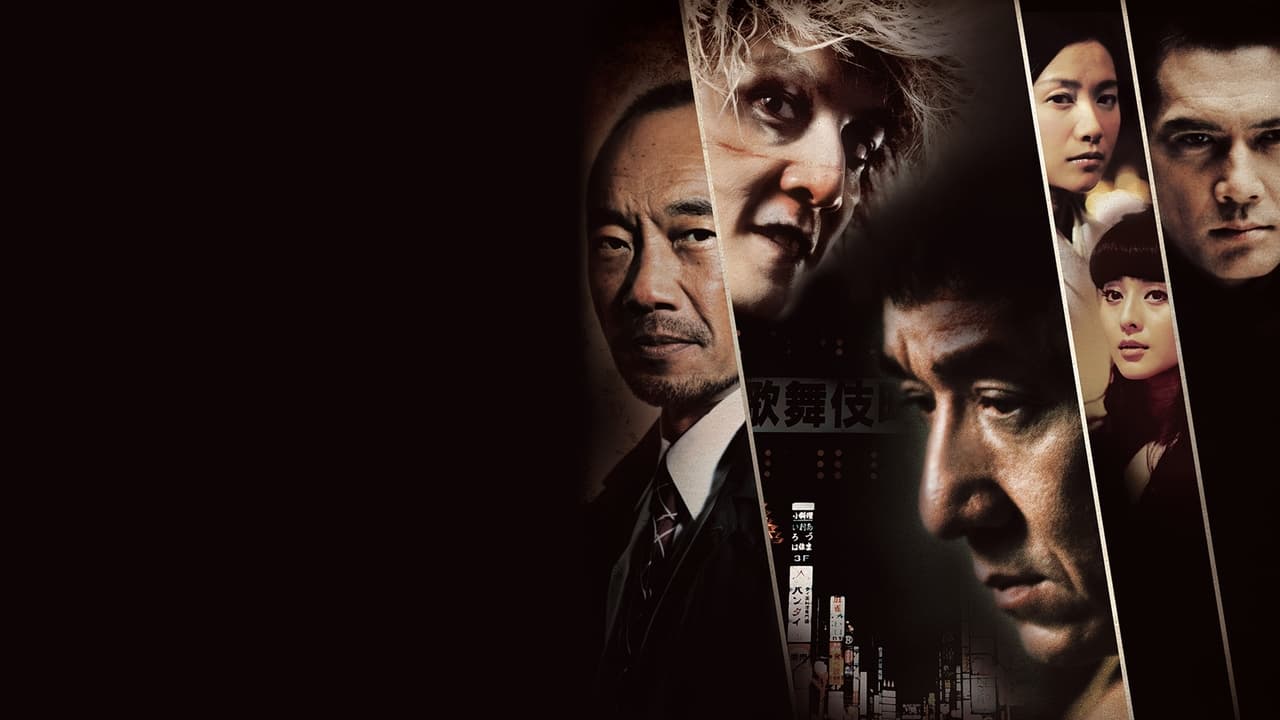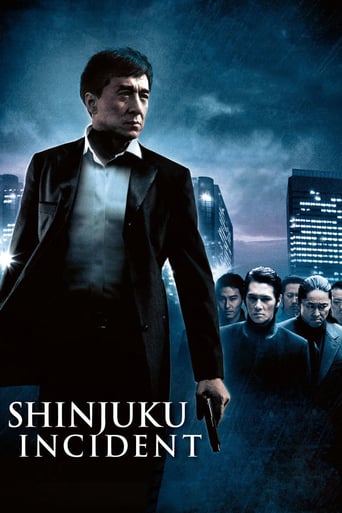



I like the storyline of this show,it attract me so much
View Morean ambitious but ultimately ineffective debut endeavor.
View MoreGood films always raise compelling questions, whether the format is fiction or documentary fact.
View MoreA terrific literary drama and character piece that shows how the process of creating art can be seen differently by those doing it and those looking at it from the outside.
View MoreIf you want deep, realistic drama this movie is for you. If it's action you're looking for, you'll be disappointed. I admit that I couldn't finish watching this movie and got rid of the blu-ray. The violence depicted is too unpleasant for my taste and I prefer martial arts instead, which is what I expected from Jackie Chan. Credit must go to him for the acting as he's showing he can put on a convincing performance in a serious role. I think this movie will appeal to a specific audience though, if that's you, you'll probably rate it much higher.
View MoreVery well made with the emphasis on the drama rather than the martial arts. Yes, there is some, but very little, I guess Jackie Chan is concentrating more on his acting these days. All the performances were very good with Jackie Chan, Naoto Takenaka and Daniel Wu (as Jie) standing out for me. It did put me in mind of films like 'Goodfells' and 'Once Upon a Time in America', maybe without the epic scope of those movies, but certainly the look and feel of them. I did find it was beginning to drag a little towards the end and I did find some of the plot lines a little predictable. Other than that, a decent watch.SteelMonster's verdict: RECOMMENDEDMy score: 7.1/10.You can find an expanded version of this review on my blog: Thoughts of a SteelMonster.
View MoreFirst, don't see this if you like Jacky Chan movies. Don't even read this review. Just go away. Sure, you might like it, but I think on average you are too likely to love comedy action above all else, and then you give it a bad review. Think of it instead like Goodfellas. Add a bit more of the pure immigrant story. Trying to make your way from the under-class. Crime because that's all you can do. Changing of the guard in the mob. Getting rank and power because you are reliable, getting screwed because you have some sense of morals, and try to protect your family. There is no absolutely good or evil, at all. People we hate at one moment evolved to that, and even then still act like humans. It's an epic crime family drama in every way and truly well made. Gore: Except for a few just terrible effects, Is correct for the location and genre. Just as many killings with guns would have seemed less violent due to the way firearms wounds are mostly depicted in movies. Knives and swords offer much more visible wounds, and so on. DO NOT watch a dubbed version. It's a drama. The dubbing is terrible so it is just not worth it.
View MoreWhen Jackie Chan's character in this, a 2009 crime film entitled The Shinjuku Incident, charges out of the restaurant at which he works so as to interrupt a brawl in an alleyway between the elderly owner of the restaurant and his daughter of about thirty with some rough looking hoodlums, one could be forgiven for expecting a martial arts sequence of some kind. Indeed, and refreshingly for a Chan movie, we are spared such things; here, the man appears as scared and as vulnerable as those he's rescuing as he veers them all away from the area - an interesting sequence humanising Chan's character and pushing him away from this all-action, kung-fu genius day-saver he usually is in other films. It's an interesting instance, one you don't necessarily expect in a movie in which Chan drives proceedings as a character named "Steelhead", and whose tag-line falls at your feet as: "They destroyed his life... Now he'll destroy them all".Indeed, the film was even released in some areas as "Jackie Chan's" Shinjuku Incident; an item which, aside from the fact using Chan's name in the title does nothing bar the encouraging of veering cinema away from said medium being one of a directorial driven ilk, and into that of an acting driven one, the alternate title couldn't be any further from the truth – this is hardly Jackie Chan's Shinjuku Incident, and the earlier promises of somebody named Steelhead having his "life destroyed" before setting out to "destroy them" is somewhat misleading. Tung-Shing Yee's film is more about the allure of crime and the idea of power corrupting oneself more than anything; the film an engaging, if unbalanced drama, about migrant Chinese workers in Japan veering dangerously down roads of a law breaking ilk after having already smashed every immigration regulation there is anyway.While coming at you with such generically inclined promises, it is a shame the rest of Yee's film is not as interesting nor as subversive. Things begin with Chan's character, otherwise known as Tie Tou, on the traditionally morally imbued locale of the farm, on which driving tractors and maintaining land is the simple, China based lifestyle he leads. The majority of the conflict Tie faces at this time is from that of his pesky infant nephews and such, whose sabotaging of these tractors leads to strife, whereas later on at home, various family members and in-laws speak vehemently of Chinese immigration to Japan and appear involved in their conversations - Tie barely offering an opinion on an issue that has not yet affected him to any degree.Eventually, Chan's character will have to ship out to Japan; an incident born out of the lack of contact with ex-girlfriend Xiu Xiu (Xu) with whom he wishes to catch up. Upon arrival, he does well not to fall foul of some local Yakuza gangsters, whose intimidating influence on the locale is introduced here early on. Additionally, he must observe the patron in front of him operate the train ticket machine so as to work it himself such is his rawness to the place; another occasion seeing him at unease with this new place forcing him into walking through an urbanised locale it is gradually revealed is a red light district. Working as a sewer maintenance worker and as a landfill employee does little for both Tie and several other Chinese immigrants whom have illegally come over to find work he develops bonds with; the crew, led by Tie, eventually veering into that of a more criminally imbued lifestyle punctuated by one of those, Jie (Wu), struggling to adapt to it. Jie's experiences of which, brutal and bloody as he alone falls foul of some rival gangsters, eventually leads him on to looking a lot like the Death Angel creature out of Shusuke Kaneko's Death Note movies.What starts as fiddled phone cards and rigged Pachinko machines escalates into something a little more, the coming into contact with rival factions of a Japanese and Taiwanese ilk leading things astray and allowing the film to morph into a piece as involving, without necessarily being as engagingly pulpy, as something like Johnny To's 2005 piece Election; although certainly making a better crack of things, as a tale of low level immigrants transforming into criminals, than that of 2007 British film Bigga Than Ben. Specifially, the moral implications of what it is these characters do are alluded to in that one of them asks frankly as to whether or not the group can now be categorised as "Triads"; while there is additionally the sub-text to do with the issue of Chinese immigration to Japan milling around in there somewhere, specifically, the problems said nation faces with such an issue when they are so criminally minded, but is largely vacant.The film is not without merit, but there is too much going on and too many characters interweaving and connecting to make it the interesting and wholly substantial piece it might have been. Sub-plots to do with Tie's girlfriends, past and present, clog up what is effectively a tale about men operating or co-existing with other men. Jie's agonising descent into a more fragile state brought about by an affirming rejection of gangsterism, but a choice that sees his brief past catch up with him anyway, is interesting - as is Tie's own struggles with his cohorts whom move up into the criminal echelons of drug trafficking. In a final act of message channelling, the film decides to detail, via a voice-over, that all of what's on screen is wrong and ill-minded and how power can corrupt, etc.; a thesis Yee explores well enough through his images without the need for explanations in what is a well played, if lopsided, drama which works a lot more than it doesn't, although retains a clawing sensation that an awful lot was left out there.
View More